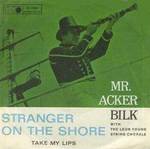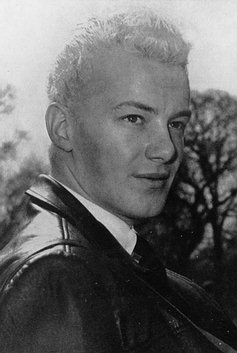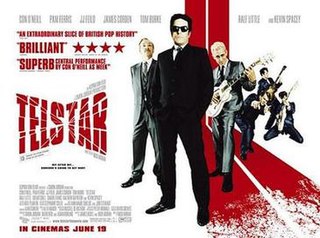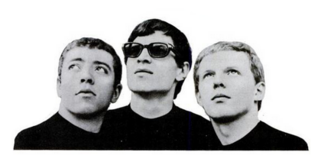
Robert George "Joe" Meek was an English record producer, sound engineer and songwriter who pioneered space age and experimental pop music. He also assisted in the development of recording practices like overdubbing, sampling and reverberation.

"Stranger on the Shore" is a piece for clarinet written by Acker Bilk for his young daughter and originally named "Jenny" after her. The tune was written on a single scrap of paper by Bilk and handed over to Leon Young (1916-1991) who crafted the string arrangement, including the characteristic harmonic shifts at the very end.
The Tornados were an English instrumental rock group of the 1960s that acted as backing group for many of record producer Joe Meek's productions and also for singer Billy Fury. They enjoyed several chart hits in their own right, including the UK and US no. 1 "Telstar", the first US no. 1 single by a British group.

John Dudley Leyton is an English actor and singer.

The clavioline is an electronic analog synthesizer. It was invented by French engineer Constant Martin in 1947 in Versailles.

The Honeycombs were an English beat group, founded in 1963 in North London, best known for their chart-topping, million-selling 1964 hit, "Have I the Right?" The band featured Honey Lantree on drums, one of the few high-profile female drummers at that time. They were unable to replicate the success of their first single and disbanded by 1967.

Heinz Burt was a German-born British rock and roll bassist and singer who performed under the stage name Heinz. He was also known as a member of the instrumental group the Tornados.
Geoffrey Goddard was an English songwriter, singer and instrumentalist. Working for Joe Meek in the early 1960s, he wrote songs for Heinz, Mike Berry, Gerry Temple, The Tornados, Kenny Hollywood, The Outlaws, Freddie Starr, Screaming Lord Sutch, The Ramblers and John Leyton. His song for Leyton, "Johnny Remember Me", reached number 1 in the UK Singles Chart.

"Johnny Remember Me" is a song which became a 1961 UK Singles Chart #1 hit single for John Leyton, backed by The Outlaws. It was producer Joe Meek's first #1 production. Recounting the haunting – real or imagined – of a young man by his dead lover, the song is one of the most noted of the 'death ditties' that populated the pop charts, on both sides of the Atlantic, in the early to mid-1960s. It is distinguished in particular by its eerie, echoing sound and by the ghostly, foreboding female wails that form its backing vocal, by Lissa Gray. The recording was arranged by Charles Blackwell. Despite the line, "the girl I loved who died a year ago" being changed to the more vague "the girl I loved and lost a year ago", the song was banned by the BBC, along with many other 'death discs', which were popular at the time.

"Have I the Right?" was the debut single and biggest hit of British band The Honeycombs. It was composed by Ken Howard and Alan Blaikley, who had made contact with The Honeycombs, a London-based group, then playing under the name of The Sheratons, in the Mildmay Tavern in the Balls Pond Road in Islington, where they played a date. Howard and Blaikley were impressed by the group's lead vocalist, Dennis D'Ell, and the fact that they had a female drummer, Anne (‘Honey’) Lantree. The group were looking for material to play for an audition with record producer Joe Meek, and they played the songs Howard and Blaikley had just given them. Meek decided to record one of them, "Have I the Right?", there and then. Meek himself provided the B-side, "Please Don’t Pretend Again".
Alan Caddy was an English rock guitarist, arranger, record producer and session musician. He was an original member of Johnny Kidd and the Pirates and the Tornados.

Telstar: The Joe Meek Story is a 2008 film adaptation of James Hicks' and Nick Moran's play Telstar, about record producer Joe Meek, which opened at the New Ambassadors Theatre in London's West End in June 2005. The film is directed by Moran and stars Con O'Neill, who also played Joe Meek in the original play, while Kevin Spacey plays Meek's business partner, Major Wilfred Banks.
Sounds Incorporated, first recorded as Sounds Inc., was a British instrumental pop/rock group which recorded extensively in the 1960s.
A Life in the Death of Joe Meek is a 2013 American independent documentary film about the British record producer Joe Meek. The film is produced and directed by Howard S. Berger and Susan Stahman.
British rock and roll, or sometimes British rock 'n' roll, is a style of popular music based on American rock and roll, which emerged in the late 1950s and was popular until the arrival of beat music in 1962. It was important in establishing British youth and popular music culture and was a key factor in subsequent developments that led to the British Invasion of the mid-1960s. Since the 1960s, some stars of the genre, most notably Cliff Richard, have managed to sustain successful careers and there have been periodic revivals of this form of music.
Don Charles was a popular English ballad singer, and record producer, and later in his life, a writer of a self-help book. He is best known for his recordings of "Walk With Me My Angel" and "Bring Your Love to Me". He also produced several of The Tornados' tracks including "Space Walk" and "Goodbye Joe". The latter title referred his original mentor and producer, Joe Meek. Meek regarded Charles highly. "You are my only legit artist", Meek once informed Charles. "All the others are yugga-dugs". Standing at 6 feet 4 inches (1.93 m), and weighing around seventeen stone, Charles stood out in more ways than one from his fellow performers.
The Moontrekkers were a British instrumental rock band in the early 1960s, who are best known for their minor chart hit "Night of the Vampire", arranged and produced by Joe Meek, and for their peripheral involvement in the early career of singer Rod Stewart.

Tab Martin is an English bass guitarist. He has been a member of well-known English bands from the 1960s. He was a member of the Tornados and played on their hit "Globetrotter". He was also a member of the Peddlers and played on their hits "Birth" and "Girlie". He also founded 1960s group the Saints.










